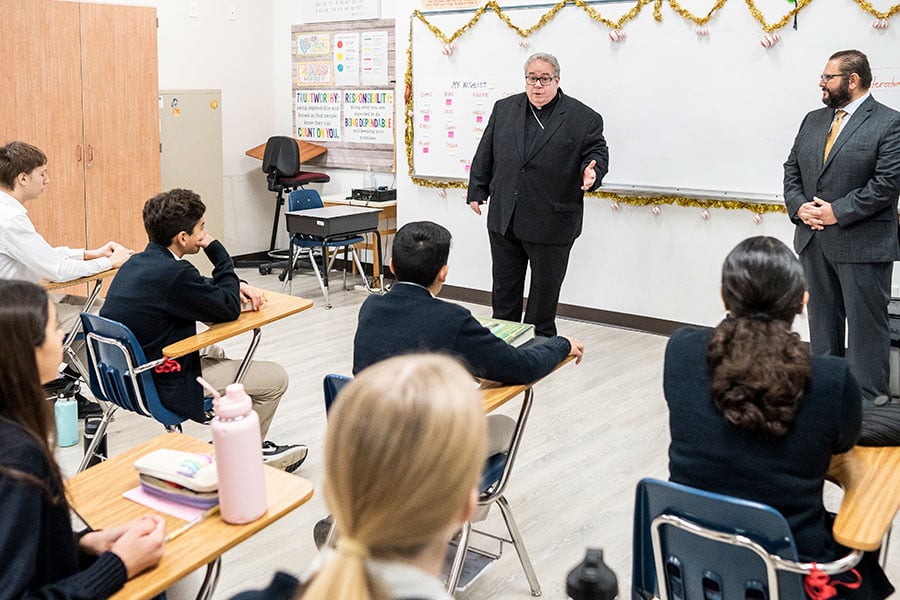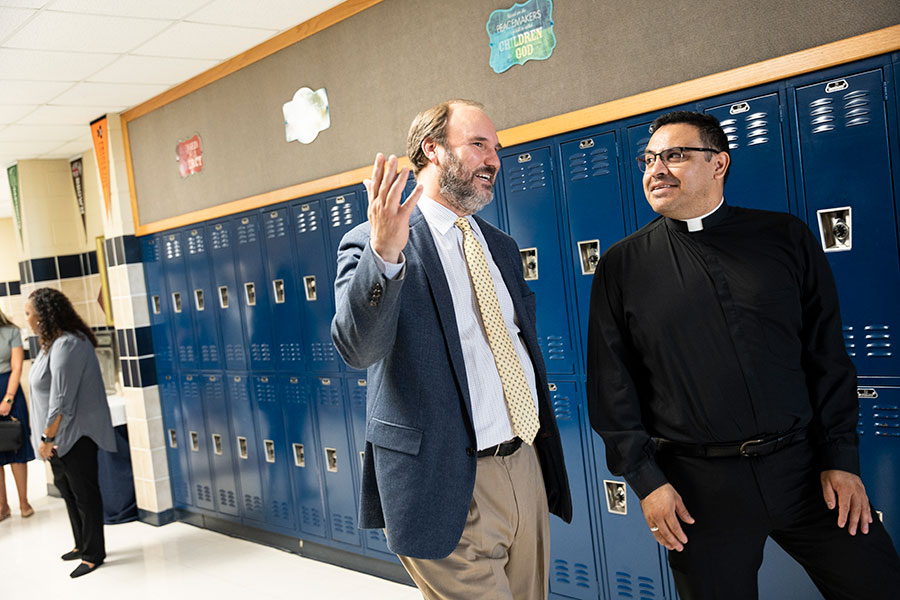The state of Catholic schools: How schools around the diocese are strengthening students in faith, knowledge, and life

Bishop Michael Olson talks with students at Immaculate Conception Catholic School on Dec. 8, 2022, the Solemnity of the Immaculate Conception. (NTC/Juan Guajardo)
FORT WORTH — Catholic schools around the nation and in the Diocese of Fort Worth are focusing on continuing to grow in enrollment, building and strengthening the faith and character of the children they serve, and refining their approach to help students thrive academically.
Leaders at the National Catholic Educational Association (NCEA) presented a panel discussion on “The State of Catholic Education” on April 11 at the NCEA 2023 Conference in Irving, and the North Texas Catholic followed up with Brinton Smith, superintendent of Catholic schools for the Diocese of Fort Worth, to get both the national and local perspectives on the current state and trends in our schools.
At both the national and local levels, enrollment is rebounding post pandemic.
Lincoln Snyder, President/CEO of NCEA, said enrollment nationwide is almost back to pre-pandemic levels.
Smith said enrollment around the diocese also has grown in recent years, even going up during COVID when public schools remained closed.
Both nationally and locally, much of the growth is focused on the early years, with pre-K, kindergarten, and early elementary seeing the biggest gains.
“We always get more growth in kindergarten, since we have both preschool and kindergarten programs,” Smith said.
Diocesan schools also reflect a national trend of drawing a greater number of diverse students, students from non-Catholic backgrounds, and special needs students.
Smith said that the diocese has been focusing on helping students with different learning needs.
“We’re trying to increase the number of services we can offer,” he said.
Diocesan schools have a year-round job posting to increase staffing of learning specialists, dyslexia teachers, and mental health counselors.
Focusing on faith and virtue
A long-standing national trend throughout American society that NCEA leaders discussed was disaffiliation with a church.
Snyder said that 65 million Americans “have ceased participating in organized religion over the last 20 years.”

John Galvan, Vice President of Assessments for NCEA, said the problem is complex.
“There’s no single reason that children are walking away from faith,” he said.
Galvan said the median age for stopping church attendance was 13, making the school years critical for helping children get a firm foundation in faith. He also said that a Pew Research Study showed that between 1972 and 2020, the percentage of Americans self-identifying as Christians had fallen from 90 percent to 64 percent.
Galvan said it was critical to “check the health and vitality of our Catholic school and parish communities.”
Smith said that schools in the Fort Worth diocese are working actively to encourage students to grow in their faith.
One key is providing a strong religious curriculum and the main emphasis here, Smith said, is using the Catechesis of the Good Shepherd (CGS).
A key component of CGS is the Atrium, a place of quiet reflection and learning where children can learn the reasons behind the sacraments and learn key parables and teachings from the Bible through hands-on activities. The primary goal is to help children draw closer to God.
Smith said that they’re also encouraging pastors and chaplains to increase sacramental life. Some schools offer multiple Masses, confessions, and Eucharistic Adoration.
The diocese also is asking pastors to get involved in discipline and providing guidance for discipline.
“We’re asking them to be present in the schools as much as possible,” Smith said. “The religious sisters help with that.”
They’re also prioritizing a positive environment, speaking of God as the source of truth, beauty, and goodness, and learning the truth about God, humans, and the created order, with a focus on developing virtue.
These concepts are at the heart of Classical Catholic education, the framework schools in the diocese have adopted in recent years under the leadership of Bishop Michael Olson.
The diocese is looking at everything with the goal of “strengthening Catholic culture and bringing Christ to students,” Smith said.
The schools also are working to increase opportunities to serve others.
One recent example is encouraging students from Nolan and Cassata Catholic high schools to go back to their parochial schools to help younger children. Other schools are serving in ministries in their parish, and the diocese is also connecting schools with Catholic Charities Fort Worth.
A number of diocesan schools have developed “House Systems,” where students are divided into teams where they can serve together and earn points.
The goal is to increase “the feeling of family” in the schools, Smith said.
Strengthening academics
At the NCEA conference, leaders discussed the importance of strong academics.
Julie Vogel, NCEA Chief Content Officer, said that Catholic schools are doing well in comparison to their public school counterparts, but scores on the National Assessment of Educational Progress in Catholic schools are mirroring a national trend in public schools of flat or slightly declining scores in reading and math.

In an age when screens on phones and computers are taking time away from reading books, she said, Catholic schools are working at teaching focus and using phonics to give children a firm foundation in reading.
In Fort Worth diocesan schools, students are taught phonics for reading, spelling, and grammar, Smith said.
“Children learn how to read and spell at the same time, and it’s very beneficial from an early age to have those literacy techniques,” he said.
Diocesan schools use Singapore math to help students learn “to think mathematically.” They don’t just learn the rules of math concepts but the reasons behind the rules.
School leaders also are incorporating assessments to track student progress.
After Smith became superintendent in early 2022, he said that “one of my first priorities was working on assessments.”
Diocesan schools are encouraged to use the Assessment of Religious Knowledge test and the Classic Learning Test.
“As we have more and more schools taking them, we can see how they’re doing,” he said.
A key component throughout diocesan schools is helping students develop a lifelong love of learning.
Smith said that teachers play a big role here because enthusiasm is contagious.
“If teachers express a love of their subject, that comes across to students,” he said.
Teachers also are encouraged to show caring to students because loving support also helps foster a love of learning.
Smith said parents and parishioners also have roles in supporting Catholic education. When they enroll their children or give to a school, they’re supporting religious vocations and future Catholic families.
“That’s where vocations come from and where Catholic families come from,” he said.
